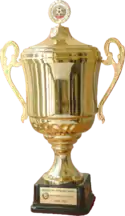PFC Lokomotiv Plovdiv
Lokomotiv (Bulgarian: Локомотив) is a Bulgarian professional association football club based in the city of Plovdiv, that competes in the country's primary football competition, the First League. Lokomotiv's home ground is the homonymous Stadion Lokomotiv which is situated in Lauta Park, in the south of the city, and has a safe capacity of 10,000 spectators.
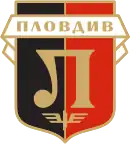 | ||||
| Full name | Professional Football Club Lokomotiv Plovdiv | |||
|---|---|---|---|---|
| Nickname(s) | Смърфовете (The Smurfs) Железничарите (The Railwaymen) | |||
| Founded | 25 July 1926 | |||
| Ground | Stadion Lokomotiv | |||
| Capacity | 13,220 | |||
| Owner | Hristo Krusharski | |||
| Chairman | Hristo Bonev | |||
| Head coach | Aleksandar Tunchev | |||
| League | First League | |||
| 2019–20 | First League, 5th | |||
| Website | Club website | |||
|
| ||||
Established in 1926, in the 2003–04 season of the A Group, Lokomotiv became champions of Bulgaria, finishing the season with three points more than the second-ranked, Levski Sofia. Lokomotiv Plovdiv have also won the Bulgarian Supercup twice, in 2004 and 2020, one Cup of the Soviet Army in 1983 and most recently – two consecutive Bulgarian Cups in 2019 and 2020. The club's biggest success in Europe to date is reaching the third round of the Inter-Cities Fairs Cup in 1965, after losing narrowly to the Italian Juventus in a play-off match.
Lokomotiv have a fierce local rivalry with fellow Plovdiv-based team Botev Plovdiv. Matches between the two sides are known as the Plovdiv derby.
History
Any proper description of the club's history requires attention to the various complex reorganisations that the club has undergone since its creation, and also how the members and fans of the team have reacted to these changes. The political environment in Bulgaria during the communist period between 1944 and 1989 led to some enforced changes in the nature of sporting clubs throughout the country, in order to follow "the Soviet model". In the particular case of PFC Lokomotiv Plovdiv, these changes led to the merger of two separate existing teams, different in nature, which in turn has lead to misinterpretations of the history of the teams. This said, a special approach is needed towards the history of the very early years of the current football club of Lokomotiv Plovdiv. In order to understand the origin of the contemporary team with its official full name, colours, and supporters, the examination of Lokomotiv's history has to be undertaken in two major "branches" – one defined largely by its followers, and the other by its functional characteristic and funding as a labour union team. These branches can be identified as that of Sportclub Plovdiv (being the fan-based team), and of ZSK Plovdiv, the club of the railway workers (being the team funded by the labour union).
Sportclub Plovdiv
In the spring of 1922 the sport club Karadzha was founded administratively by the consolidation of some casual amateur football teams in one of the districts of the city of Plovdiv, so that the players can compete in the Championship of Plovdiv. Two years later, in 1924, another sport club called Atletik was formed in precisely the same district of Plovdiv.
On 26 July 1926 these two sport clubs, Karadzha and Atletik, merged to form the a single club named Sportclub. The Sportclub football team chooses white, black and red as the colours of their kits and their crest, and also the year of establishment 1926 is added several years later the crest. Nowadays, Lokomotiv Plovdiv still uses the same colours for their kits and crest, while the full name of the team (Professional Football Club Lokomotiv 1926 Plovdiv) shows that the year the club asserts itself to have been established is the year in which Sportclub was founded.
Sportclub had its home ground in the city centre. However, after the disastrous earthquake in South Bulgaria in 1928, the team decided to donate their land to people who had lost their homes so that they can construct new ones where the club's grounds were. Because of that, from 1928 Sportclub did not have their own football field for more than two decades.
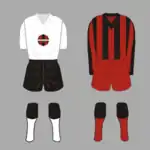
In the years after Sportclub was created, the football team competed in the local Championship of Plovdiv. In the early years of Bulgarian football there was no national league and thus the local championships, held at a regional level, were the most prestigious football tournaments in the country. Sportclub participated in the second division of the Championship of Plovdiv until 1933, when the team finished first in the second division and was promoted to Plovdiv's top tier as of 1934. In 1936, Sportclub became the Champion of Plovdiv for the very first time.
In 1938 the team joined the National Football Division – the countrywide football league which had been formed only a year earlier and which included Bulgaria's top ten teams. However, in 1940 the league was disbanded because of World War II. By that time the club had officially changed its name to Plovdivski Sportclub (meaning Sportclub of Plovdiv), primarily because several other teams in the league also had Sportclub in their name.
During the years of World War 2, the team participated in several other tournaments including the Tsar's Cup considered Bulgaria's most prestigious knock-out cup tournament at the time and a predecessor of the current domestic cup tournament. In the Tsar's Cup the team reached the finals twice – in 1940 and again in 1942.
By the time of communist rule in Bulgaria in 1944, Sportclub had become one of the best performing teams in the country, with a constant participation in the final phases of the most prestigious tournaments. The club as an organisation had become the biggest in the region of Plovdiv in terms of members and had also acquired a dedicated fan following, continually setting attendance records for the period.
The Club of the Railway Workers in Plovdiv
In the mid-1930s, the Bulgarian labour union of the railway workers and sailors established numerous cultural and sporting organisations across the country. The railway workers established a sports club in Plovdiv as well, since the city is one of the major railway centres in the country. On 13 June 1935 the club ZSK Plovdiv was founded, abbreviated from Zheleznicharski Sporten Klub Plovdiv meaning in English the sporting club of the railway workers in Plovdiv.
The first few years of the club's football team were a struggle; their results could not compare to the success achieved by some of the other teams of the city such as Sportclub or Botev Plovdiv. The club was not even recognized as a full member of the national sport federation until three years after its creation. However, by the early 1940s the team had improved hugely and in 1944 they won the Championship of Plovdiv.
From an economic aspect, the railway club contributed very heavily to the development of sports in the region of Plovdiv, making large investments for the improvement of sporting facilities and conditions in the city. Most notably, the powerful national railway company, through ZSK Plovdiv, was the main benefactor for the creation of a state-of-the-art multi-purpose stadium in the city that opened in 1943. The stadium was constructed on the football pitch of the existing team of Levski Plovdiv and as such was the home ground for both ZSK Plovdiv and Levski Plovdiv. As a result, the stadium was named "ZSK-Levski".
Changes in Sportclub
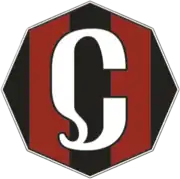
In the years after 1944, the newly established communist rule embarked on several campaigns for the "reorganisation of the sporting clubs in Bulgaria" so that they were aligned with the Soviet political agenda and followed the "Soviet model" of sport clubs. This meant that every local region should have its own sports club, but in order to make central investments more efficient for a larger member-base, only a few clubs were permitted per area. The led to the forced merger of clubs within the same locality.
Thus, starting from 1944 Sportclub was merged with numerous other sports teams in the same district of Plovdiv. Being from an area with a population from variety of ethnic and religious backgrounds, the club was first merged with several lower-division, so-called "Armenian", teams such as Shant and Erevan. Another merger followed in 1945 with the "Catholic" club Parchevich. After this wave of mergers, like many other clubs in the country, the club was renamed to an abbreviation of the biggest clubs merged – the new name was "S.P.-45", meaning Sportclub Parchevich – 1945. However, because of the "Western" phrasing ("sport" and club" are non-Slavic words) the team was officially renamed again before the start of the season – the name of the club now became "Slavia Plovdiv.
In 1947 a new wave of consolidations of the sport organisations in the country saw Slavia Plovdiv merged with the team of the cooperative workers union which was called Petar Chengelov. This merger created a club known as Slavia-Chengelov.
During the period 1944–1955, the club reached the final of the domestic knock-out cup (at that time being the Cup of the Soviet Army) for the third time in its history – in 1948 as Slavia-Chengelov.
In season 1948 the club became one of the ten founder teams of the new national top league – "A" Republican Football Group (A RFG) – the predecessor of the current Bulgarian top division league .
Through all these mergers, the club originally named Sportclub had kept its original colours and also the core of its team, with only a small number of players from all the incorporated squads being considered good enough to find a place in the first team of the "new" club. As for the fans, the supporters of Sportclub remained loyal to the colours and the players, and the followers of the assimilated clubs joined them, increasing still further the number of fans and members of the largest club in Plovdiv at that time. Though technically the numerous clubs merged, because of the sheer size of Sportclub in terms of members, the smaller clubs were effectively assimilated into the larger black-white-and-red club.
Changes in ZSK
For ZSK Plovdiv, the "reorganisation of sport clubs" in line with the Soviet model began in the autumn of 1944. The club was initially merged with the team with which it shared a stadium, Levski Plovdiv, to form ZSK-Levski. However, unlike most other forced mergers at that time, the ZSK-Levski merger was dissolved in less than a year.
After separation in 1945, ZSK was renamed to Lokomotiv Plovdiv similar to other teams in the various countries of the Eastern bloc which were connected in some way with the railways (well-known examples being Lokomotiv Sofia, Lokomotiv Moskva, Lokomotiv Leipzig). Lokomotiv Plovdiv and Levski continued to co-exist as separate entities, still sharing the same stadium.
Although the club of the railway workers was financially backed by the national railway company, in the first years of the communist rule the football team competed only at the third level of the recently formed national league. Furthermore, the club was the smallest in Plovdiv in terms of members and attracted only a modest number of spectators for its games, despite its large, state-of-the-art stadium.
Merger of Slaviya-Chengelov and Lokomotiv Plovdiv
In the summer of 1949, the Bulgarian Communist Party adopted a new principal governing the construction of sports clubs. According to the new political agenda, clubs had to serve primarily as the physical fitness departments of politically important national enterprises (such as the oil refineries, the police, the army, the national railway company, and others). Thus, the geographical location of a club was no longer important and clubs were assigned to the major institutions in the country.
The reorganisations of 1949 assigned Lokomotiv to assimilate Slavia-Chengelov, since Lokomotiv was already a team strongly associated to a significant national enterprise. Yet, by that time Slavia-Chengelov was the largest club in Bulgaria in terms of members, and with an even larger fan-base. Hence, the strange situation arose that the smallest club in Plovdiv (namely Lokomotiv) had to assimilate one of the biggest and most popular teams in the entire country.
In October 1949, the formal assimilation of Slavia-Chengelov into Lokomotiv took place to form a new club, named DSO Energiya, before the start of season 1950. This club used the colours of Slaviya-Chengelov (white, red, and black) for both the kits and the crest of the football team, and the team itself retained only four players from Lokomotiv – the core of the squad remained the players of Slaviya-Chengelov. Nevertheless, after more than two decades after the earthquake in 1928, the fans of what-was-once Sportclub now had a proper home ground – the stadium of Lokomotiv.
DSO is an abbreviation meaning national sports organisation. However, just months after DSO Energiya was created, changes in the formal names of clubs in the Soviet Union took place, which in turn inspired the renaming of several clubs in Bulgaria. A popular at the time name for Eastern bloc sports clubs – Torpedo – was adopted for DSO Energiya and they were thus renamed as Torpedo Plovdiv.
For season 1950 Torpedo Plovdiv took the place of Slavia-Chengelov in the top level of the Bulgarian football league system (A RFG). Yet, during the season it became clear that the club would have to undergo some further changes because of the national policy which insisted that, as part of the railway union, club members had also to be members of the union. This included all the players of the football team as well as the members of the sport club in general, the largest number of which had been members of Slavia-Chengelov, who had no connection at all to the railways.
Thus, in 1951 before the new season began, the railway union established a new club by the name of DSO Lokomotiv (Plovdiv) which used the same colours for its football team as Torpedo and played at the same stadium. The union also transferred all the players of Torpedo in DSO Lokomotiv, and in order to make them official union members each player was nominally employed in the national railways. Meanwhile, Torpedo Plovdiv was taken out of the labour union and no longer funded by it or the railway company. DSO Lokomotiv also acquired the license of Torpedo to play in the top tier of the Bulgarian football league, while Torpedo itself is relegated to the third division of the league due to the lack of an official license. By creating the new club and nominally employing the players in the railways, the labour union effectively legitimised the new club without the need to limit the access of members of Torpedo to the sports facilities. Existing members of Torpedo could still use all the facilities which were shared between the two clubs and it was no longer deemed necessary for them to be members of the railway union.
So, from the start of season 1951 the fans of Torpedo Plovdiv from 1950 now found themselves supporting the same players, with the same colours, in the same stadium, but newly named as DSO Lokomotiv Plovdiv. As official membership in the club now required a job in the railways, the official number of members of the club was drastically smaller in than the previous years. Nevertheless, the supporters of the team remained the same. Hence, in 1951 DSO Lokomotiv is effectively the successor of Torpedo even though the Torpedo club continued to exist at a lower level.
From 1951 to 1954 the team was one of the best performers in the Bulgarian football elite, annually reaching at least the quarter-final phase of the domestic cup competition (at that time recognised to be the Cup of the Soviet Army) and regularly finishing high in the top division league.
First Relegation from the Elite (1955–1960)
In 1955 the playing squad of DSO Lokomotiv was entirely changed – many key players were considered to be growing old and were transferred to other teams, but their replacements seemed to be unable to collaborate and were not of the same quality. Inevitably, at the end of that season DSO Lokomotiv were relegated to the second division of Bulgarian football. For the fans the following season would be the first time their team played outside the most prestigious echelon of Bulgarian football.
DSO Lokomotiv played in the second division for five seasons, until in 1960 it finally earned its promotion back to the elite level for season 1961–62. In the same year, the team reached the final of the domestic cup for the fourth time in its history (after 1940 and 1942 as Sportclub, and 1948 as Slaviya-Chengelov), but, as in the previous three finals, it lost.
During its stay in the second division, the club experienced yet again the reorganisation of sports politics in the People's Republic of Bulgaria that took place in 1957. According to the changes, clubs were no longer required to be affiliated to national enterprises and instead the emphasis returned to the geographical territory principle. Thus, sport clubs no longer needed to be "DSO" (an abbreviation meaning in English "voluntary sports organisation"). Consequently, as a club with many supporters in its area, DSO Lokomotiv assimilated the clubs Torpedo Plovdiv (with which it still shared a stadium) and Septemvri (Plovdiv). As the club now no longer needed to be "DSO", it changed its name to "Lokomotiv Plovdiv', which it has retained to this day.
Success Home and Abroad (1960–1985)
After re-entering the elite (A RFG) in 1961, it took Lokomotiv seven years to reach the top 3 and get a medal in season 1968–69.
On an international level however, the team achieved success more quickly. In season 1964–65, Lokomotiv Plovdiv reached the Third Round of the Inter-Cities Fairs Cup, where after two draws with the famous Italian team of Juventus with Omar Sívori, Luis del Sol and Sandro Salvadore in their squad (each ending with a score 1:1), a third play-off match was chosen by UEFA to be played in Torino. The game was extremely close but ended with a narrow, but heroic, loss by Lokomotiv with a score of 2:1.
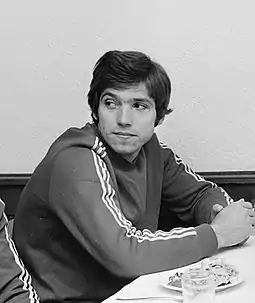
Before reaching the Third Round, Lokomotiv had previously eliminated the Serbian FK Vojvodina and the Romanian FC Petrolul Ploieşti. Key players during this period include forward Gocho Vasilev, star midfielder Hristo Bonev, defender Ivan Boyadzhiev and goalkeeper Stancho Bonchev.
In 1971, the team reached the final of the domestic cup but once again lost it, this time to Levski Sofia with a score of 3:0.
In 1973, Lokomotiv won the silver medals of A RFG, finishing the season with 43 points, 7 less than the first placed team, CSKA Sofia. The following year, another celebration is in order – in 1974 Lokomotiv finished the season in the third place getting the league bronze. In the following few years period the team is quite stable and it was very rarely standing under the 6th position in the league table. Among the team's players was Hristo Bonev – considered by most Loko fans as being the greatest player of the club ever, and also one of the greatest Bulgarian born players.
Sadly, in season 1979–80 Lokomotiv Plovdiv is again relegated to Bulgaria's second football division, but this time it takes the team only three seasons to earn its place back in the football elite.
Despite being in second division between 1981 and 1983, Loko reached the final of the Cup of the Soviet Army twice. In 1982, for the sixth time the team still cannot win the domestic cup. In 1983 however, led by Hristo Bonev, Lokomotiv won their first national cup by beating FC Chirpan 3:1 at Vasil Levski National Stadium in Sofia on 1 June. (Be that as it may, it is important to note that the tournament of the Cup of the Soviet Army, held annually between 1946 and 1990, is recognised by the Bulgarian Football Union(BFU) as the primary domestic knock-out cup tournament up to 1982. In 1981, the tournament for the Bulgarian Cup begins to take place every year and rises in prestige, overtaking the significance of the Cup of the Soviet Army in subsequent years. At present, the BFU's official policy is that it considers the Bulgarian Cup to be the primary domestic knock-out cup from 1983 onwards. Thus, nowadays the Cup of the Soviet Army won in 1983 by Lokomotiv Plovdiv is the first officially non-recognised as the domestic cup Soviet Army trophy; i.e. Lokomotiv Plovdiv is not officially recognised as the bearer of the domestic cup for 1983 – it is a non-official bearer. Yet, at that time, the Soviet Army Cup was for all intents and purposes, the domestic football knock-out cup trophy.)
In 1982 the team acquired a new stadium, situated in park "Lauta" near the city's newest district. "Lokomotiv" Stadium is part of a multi-sports complex also used by the other sports teams of the sports club (such as the volleyball, tennis and the boxing teams of "Lokomotiv" Plovdiv). In season 1983–84, even though the club has just been promoted to the top division, and in defiance of being the Soviet Army Cup holder, Loko Plovdiv was relegated again and played season 1984–85 in the second level of the Bulgarian league system. In 1985 the team earns it promotion back to A RFG.
1985–2000
After its return to the top division in 1985 the team makes a steady performance for over a decade, placing itself in the middle of the league table until the late 1990s. During that time the team finishes in top 3 only once – in season 1991–92.
In the late 1990s the form of the team worsens which takes them out of the elite again, and in seasons 1998–99 and 1999-00 Lokomotiv Plovdiv plays in B PFG.
Georgi Iliev Years (2000–2004)
In 2001 the club is bought by Georgi Iliev. At that time, Iliev owns another football club – Velbazhd Kyustendil. The team from Kyustendil has a very good performance in the Bulgarian top division (A PFG) finishing in third place three consecutive seasons until 2000–01 and is a national cup runner-up in 2001.
In season 2001–02 Iliev decides to merge the two teams creating the contemporary Lokomotiv Plovdiv (full name: Professional Football Club Lokomotiv 1926 Plovdiv). The new club is based in the grounds of the Lokomotiv that merged with Velbazhd, uses the same colours and is the official successor of that club. Yet, the team was formed almost entirely of the players performing excellently in the last years in the club from Kyustendil. As a result, that team finished third again at the end of the season.
The most successful season in the club's history was the 2003–04 campaign. Lokomotiv won the title, the first and so far the only in the club's history. The coach, Bulgarian Eduard Eranosyan, formerly football player of the team started the 2003–04 well, with Lokomotiv leading the league by six points halfway through the season and remaining unbeaten. In the penultimate, 29th round, The Smurfs defeated Slavia Sofia in Plovdiv by 3:2 in front of more than 17,000 spectators, and Lokomotiv won the Bulgarian championship. Lokomotiv finished the season with 75 points, 3 more than the second, Levski Sofia. In the team lines was recent acquisition Martin Kamburov who became the goalscorer in Bulgaria with 26 goals. Key players during the fantastic season included Vasil Kamburov, Georgi Iliev, Aleksandar Tunchev, Kiril Kotev, Vladimir Ivanov, Metodi Stoynev and the Macedonians Boban Jančevski, Vančo Trajanov and Robert Petrov.
A few months later, the team played for the first time in the UEFA Champions League qualifying rounds where they faced Club Brugge from Belgium in the second qualifying round.
The same year, Lokomotiv won the Bulgarian Supercup, after beating Litex Lovech. In the final, Ivan Paskov scored a brilliant header in the last seconds of the game for the 1:0 win.
Recent history (2004–present)
The next 2004–05 season in the domestic league was also very successful for the team, which finished 3rd in A PFG, and qualified for the UEFA Cup. In the European club competition, Lokomotiv defeated Serbian OFK Beograd in the second qualifying round (1:0 home win and 1:2 away loss) and were drawn to play against the English Bolton Wanderers in the first round. However, the team from Plovdiv was eliminated after a 1–2 loss at the Reebok Stadium in Bolton and another 1–2 loss in a match, played at the Lazur Stadium in Burgas.[1]
In the next few months the club had big financial problems. Because of these problems, many of the players of the champions team, as Aleksandar Tunchev, Martin Kamburov, Ivan Paskov, Georgi Iliev, Darko Spalević, Kiril Kotev and Boban Jančevski left the club.
In the 2005–06 season Lokomotiv finished 5th in A PFG and qualified for the Intertoto Cup. Loko were eliminated with a 2–3 (1–2 away loss and a 1–1 home draw) on aggregate by Romanian Farul Constanţa.
In the next three seasons, the team finished in the middle of the table. In December 2009, the businessman and ex-Vihren Sandanski owner Konstantin Dinev acquired the club from Galina Topalova in a 2 million euro bid, with the clear intention to bring Loko back to European club competition.
On the 15th of May 2019, Lokomotiv Plovdiv won the Bulgarian Cup for the first time in the club's history, with a 1–0 win over local rivals Botev Plovdiv, in Sofia. This enabled the team to play in the Europa League second qualifying round for the 2019–20 season. In the second round, Lokomotiv faced FC Spartak Trnava from Slovakia. Lokomotiv won the tie on aggregate, with a score of 3–3, progressing to the next round via the away goals rule. In the next round came a much harder opponent, in the name of Strasbourg. Lokomotiv entered as clear outsiders against the French side, and lost the first game 0–1 in Bulgaria. In the second match, the Railroaders again lost with a minimum score of 1–0, being eliminated on aggregate 0–2.
The 2019–20 season was even more successful for Lokomotiv. The team managed to win the Bulgarian Cup for a second consecutive time, becoming the first team since PFC Litex Lovech to win consecutive cups, after Litex did it in 2008 and 2009. In the final, the Railroaders beat CSKA Sofia after a penalty shootout. Lokomotiv also maintained a good form in the league, qualifying for the Championship Round and being in the top 3 until the very last rounds.
Crest and colors
The configuration of the crest consists of a shield colored in red and black and a golden letter 'L' (Bulgarian: Л) placed in the center. A white stripe with inscription 'Plovdiv' is positioned on the upper part of the shield. The wings in the bottom of the shield represent the historical bond between the football club and the national railway company.
Lokomotiv Plovdiv's traditional home colors are white, black and red. In the past the club has also adopted a sky blue as a kit color.
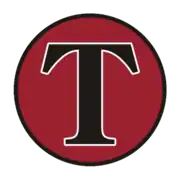
1949 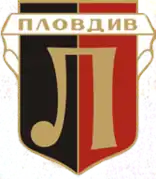
1951 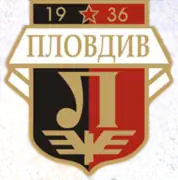
1970 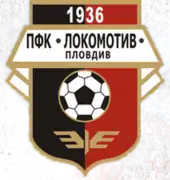
1985 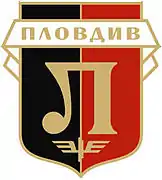
2011
Honours
 Winners (1): 1983
Winners (1): 1983
Players
First-team squad
As of 1 August 2020
Note: Flags indicate national team as defined under FIFA eligibility rules. Players may hold more than one non-FIFA nationality.
|
|
For recent transfers, see Transfers summer 2020 and Transfers winter 2021.
Foreign players
Up to three non-EU nationals can be registered and given a squad number for the first team in the First League. Those non-EU nationals with European ancestry can claim citizenship from the nation their ancestors came from. If a player does not have European ancestry he can claim Bulgarian citizenship after playing in Bulgaria for 5 years.
|
EU Nationals |
EU Nationals (Dual citizenship) |
Non-EU Nationals |
Retired numbers
8 – ![]() Hristo Bonev, striker (1963–67, 1968–79, 1982–84)
Hristo Bonev, striker (1963–67, 1968–79, 1982–84)
European Record
- As of 27 August 2020
| Competition | Played | Won | Drew | Lost | GF | GA | GD | Win% |
|---|---|---|---|---|---|---|---|---|
| UEFA Champions League | 2 | 0 | 0 | 2 | 0 | 6 | −6 | 0.00 |
| UEFA Cup / UEFA Europa League | 27 | 8 | 2 | 17 | 36 | 56 | −20 | 29.63 |
| UEFA Intertoto Cup | 2 | 0 | 1 | 1 | 2 | 3 | −1 | 0.00 |
| Total | 31 | 8 | 3 | 20 | 38 | 65 | −27 | 25.81 |
Matches
- As of 27 August 2020
| Season | Competition | Round | Club | Home | Away | Aggregate |
|---|---|---|---|---|---|---|
| 1965–66 | Fairs Cup | 1Q | 1–1 | 1–1 | 2–0 (Playoff) | |
| 2Q | 2–0 | 0–1 | 2–1 | |||
| 3Q | 1–1 | 1–1 | 1–2 (aet) | |||
| 1967–68 | Fairs Cup | 1Q | 1–1 | 1–5 | 2–6 | |
| 1969–70 | Fairs Cup | 1Q | 1–2 | 1–3 | 2–5 | |
| 1971–72 | UEFA Cup | 1Q | 3–1 | 0–3 | 3–4 | |
| 1973–74 | UEFA Cup | 1Q | 1–0 | 2–0 | 3–0 | |
| 2Q | 3–4 | 2–3 | 5–7 | |||
| 1974–75 | UEFA Cup | 1Q | 3–1 | 1–3 | 4–4 (p) | |
| 1976–77 | UEFA Cup | 1Q | 2–1 | 1–4 | 3–5 | |
| 1983–84 | UEFA Cup | 1Q | 1–2 | 1–3 | 2–5 | |
| 1992–93 | UEFA Cup | 1Q | 2–2 | 1–7 | 3–9 | |
| 1993–94 | UEFA Cup | 1Q | 0–2 | 0–2 | 0–4 | |
| 2004–05 | UEFA Champions League | 2Q | 0–4 | 0–2 | 0–6 | |
| 2005–06 | UEFA Cup | 2Q | 1–0 | 1–2 | 2–2 (a) | |
| PO | 1–2 | 1–2 | 2–4 | |||
| 2006 | UEFA Intertoto Cup | 2Q | 1–1 | 1–2 | 2–3 | |
| 2012–13 | UEFA Europa League | 2Q | 4–4 | 1–3 | 5–7 | |
| 2019–20 | UEFA Europa League | 2Q | 2–0 | 1–3 | 3–3 (a) | |
| 3Q | 0–1 | 0–1 | 0–2 | |||
| 2020–21 | UEFA Europa League | 1Q | N/A | 1–0 | 1–0 | |
| 2Q | 1–2 | N/A | 1–2 |
- Notes
- 1Q: First qualifying round
- 2Q: Second qualifying round
- 3Q: Third qualifying round
- PO: Play-off round
Rivalries and Friendships
Rivalries
Lokomotiv's main rival is the neighbouring club of Botev Plovdiv forming the Plovdiv derby. The two teams are the most supported ones in the second largest city in Bulgaria. Traditionally, Lokomotiv drew support from the lower working classes of society whereas Botev drew support form the middle and upper communist classes, although that no longer applies.[2]
Another rivalry Lokomotiv Plovdiv has is with one of Bulgaria's most successful football clubs – CSKA Sofia. The rivalry has a geopolitical nuance, first because of the historical competition between the cities of Plovdiv and Sofia as cultural, political and economical centres, and second because of the association of CSKA with the Bulgarian Army same as rival Botev Plovdiv.
Friendships
A rather friendly rivalry the team from Plovdiv has is with "brother" team of Lokomotiv Sofia. The teams are historically connected because of their historical positions as the teams of the railway workers of Plovdiv and Sofia. They are the most successful and supported clubs the railway workers in Bulgaria were connected to, so matches between the teams are often called The Railroaders' Derby. However, the teams were never direct competitors for the title and supporters never had massive confrontations, hence the derby is rather friendly.
The Lokomotiv fans have a long-standing friendship with fans of Italian team SSC Napoli. Napoli gave birth to the name Napoletani Ultras Plovdiv and that is how the friendship arose.
Support
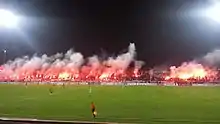
Since its foundation, Lokomotiv has been one of the best supported football clubs in Bulgaria. In the early years of Bulgarian football the team's fans broke attendance records on numerous occasions,[3] even though many times the conditions were not at all hospitable (since 1928 the team did not have a home ground for more than 20 years).[4] By the 1940s the club was one of the largest in the country in terms officially registered members.[5] In 1968 supporters of the team established the amateur football club Friends of Lokomotiv Plovdiv as a means of organised support for the team, and in 1988 the official fan-club of the team – Club of the Supporters of Lokomotiv Plovdiv – was established as the first of its kind in Bulgaria. The political setting (the regime) of the time was unfavourable towards independently formed organisations.[6] In recent years, the team's fans have organised an amateur football tournament called Liga Lauta the proceedings from which go for the club's youth academy.[7] Organisers intend the extend the initiative to an annual tournament.
Lokomotiv holds the first place for many of Bulgarian largest recorded attendances. In the 80s the club was extremely popular and had the biggest away invasions among all clubs. That includes 20,000 people in the final of the Soviet cup in 1983. The club also holds a record attendance for a championship home game in Plovdiv- 50,000 people versus Beroe. And all of that despite being in the Second Bulgarian league at the time. When Lokomotiv finally managed to win the title there were 40,000 people on the main square of the city celebrating the victory of the Smurfs.
As of the start of the reconstruction project of Lokomotiv Stadium, the club's fans decided to give an official name to the sector that is to contain the fiercest team supporters. The home of the factions was chosen to be called Bessica Tribune (after the name of the ancient Thracian tribe whose artefacts were discovered in the surroundings of the stadium), but since the project has been put on hold the name Bessica Tribune has been used as a collective name for the most dedicated followers. Lokomotiv Plovdiv also has a well-recognised football hooligan fan base. Some of the most prominent factions are Lauta Hools, Got Mitt Uns, Napoletani 1995, and Lauta Youths.
Lauta Hools, also called Usual suspects, founded in 1994, adhere to the British way of support and are casuals, and it is not uncommon to see the Union Jack in the stands as a result.[8]
Recent seasons
League positions

| Season | Tier | Position | M | W | D | L | G | D | P | Bulgarian Cup | Notes |
|---|---|---|---|---|---|---|---|---|---|---|---|
| 2005–06 | A Group | 5 | 28 | 11 | 7 | 10 | 43 | +1 | 40 | Round of 32 | |
| 2006–07 | A Group | 7 | 30 | 13 | 4 | 13 | 47 | +4 | 43 | Semi-finals | |
| 2007–08 | A Group | 9 | 30 | 12 | 7 | 11 | 37 | +9 | 43 | Quarter-finals | |
| 2008–09 | A Group | 6 | 30 | 12 | 7 | 11 | 40 | -3 | 43 | Round of 32 | |
| 2009–10 | A Group | 12 | 30 | 9 | 6 | 15 | 36 | -16 | 33 | Round of 32 | |
| 2010–11 | A Group | 5 | 30 | 14 | 10 | 6 | 54 | +26 | 52 | Quarter-finals | |
| 2011–12 | A Group | 6 | 30 | 17 | 6 | 7 | 44 | +5 | 57 | Runner-Up | 2012 Bulgarian Supercup Runners-Up |
| 2012–13 | A Group | 9 | 30 | 10 | 9 | 11 | 37 | +3 | 39 | Round of 32 | |
| 2013–14 | A Group | 7 | 38 | 15 | 5 | 18 | 49 | -6 | 50 | Semi-finals | |
| 2014–15 | A Group | 10 | 32 | 9 | 5 | 18 | 28 | -24 | 32 | Semi-finals | |
| 2015–16 | A Group | 5 | 32 | 15 | 4 | 14 | 40 | -5 | 49 | Round of 16 | |
| 2016–17 | First League | 5 | 36 | 14 | 10 | 12 | 50 | -2 | 52 | Quarter-finals | |
| 2017–18 | First League | 8 | 36 | 11 | 11 | 14 | 35 | -13 | 44 | Round of 16 | |
| 2018–19 | First League | 10 | 34 | 10 | 8 | 16 | 37 | -3 | 38 | Winners | 2019 Bulgarian Supercup Runners-Up |
| 2019–20 | First League | 5 | 31 | 15 | 8 | 8 | 53 | +18 | 53 | Winners | 2020 Bulgarian Supercup Winners |
Managerial history
As of 20 May 2014
|
References
- "Bolton 2–1 Lokomotiv Plovdiv". BBC News. 15 September 2005. Retrieved 2005-09-15.
- http://www.footballderbies.com/honours/index.php?id=81
- "МНОГОБРОЙНИ ПРИВЪРЖЕНИЦИ, ЧАСТ ВТОРА: ДЕСАНТИТЕ В ЧЕРНО-БЯЛО-ЧЕРВЕНО" [Numerous Supporters, Part Two: The Raids in Black-White-and-Red] (in Bulgarian). 13 Aug 2013. Retrieved 9 May 2014.
- "ИСТОРИЯТА НА ЛОКОМОТИВ ПЛОВДИВ" [The History of Lokomotiv Plovdiv] (in Bulgarian). 28 Apr 2010. Retrieved 9 May 2014.
- "ИСТОРИЯТА НА ЛОКОМОТИВ ПЛОВДИВ" [The History of Lokomotiv Plovdiv] (in Bulgarian). 28 Apr 2010. Retrieved 9 May 2014.
- "25 ГОДИНИ КЛУБ НА ПРИВЪРЖЕНИЦИТЕ НА ЛОКОМОТИВ ПЛОВДИВ" [25 Years Club of the Supporters of Lokomotiv Plovdiv] (in Bulgarian). 10 May 2013. Retrieved 9 May 2014.
- "Сезонът на "Лига Лаута" приключва тази седмица" [Liga Lauta Season Ends This Week] (in Bulgarian). 21 Apr 2014. Retrieved 9 May 2014.
- http://lautahools.org/?lang=en
External links
| Wikimedia Commons has media related to PFC Lokomotiv Plovdiv. |
- Official website (in Bulgarian)
- Official fan-website (in Bulgarian)
- Historical fan-website (in Bulgarian)
- Official Facebook page (in Bulgarian)
